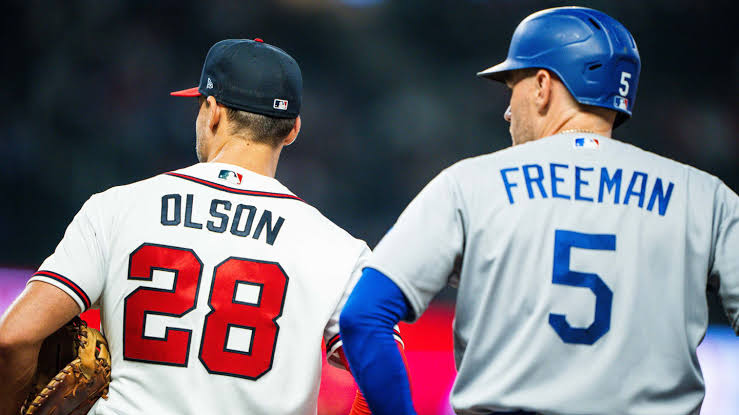“What Has Gone Wrong Between Us May Not Ever Come Right Again…” Olson Gets on Nerve Against Freeman Due to Internal Team Conflict
In a dramatic turn of events within the Atlanta Braves’ clubhouse, star first baseman Matt Olson has publicly acknowledged a significant rift with his teammate Freddie Freeman, stating, “What has gone wrong between us may not ever come right again.” This candid admission has cast a spotlight on the internal dynamics of the team and revealed a growing tension between two of its key players.
The friction between Olson and Freeman appears to have reached a boiling point, stemming from a series of undisclosed internal team conflicts. Sources close to the team indicate that the discord has been brewing for some time, manifesting in strained interactions and a palpable divide within the clubhouse. The exact nature of the issues remains unclear, but it is evident that the relationship between the two players has deteriorated significantly.

Matt Olson’s statement suggests a deep-seated frustration and a sense of resignation about the possibility of reconciliation. The phrase, “may not ever come right again,” implies that the damage done to their relationship might be irreparable. This is particularly concerning given the importance of cohesion and unity in a successful baseball team, where players must rely on each other both on and off the field.
Freddie Freeman, a longtime cornerstone of the Braves and a respected leader within the team, has yet to publicly respond to Olson’s comments. However, sources suggest that the conflict may involve differences in leadership style, personal disagreements, or issues related to their roles within the team. Freeman, known for his consistency and leadership, may have clashed with Olson over various aspects of team dynamics or on-field responsibilities.
The discord between Olson and Freeman is not just a personal matter but could have broader implications for the Braves’ performance and team morale. A lack of harmony between key players can lead to distractions, undermine team spirit, and affect overall performance. The Braves, aiming to remain competitive and chase championship aspirations, can ill afford such internal strife.
Team management is reportedly aware of the tensions and may be working behind the scenes to address the issues. The involvement of coaches, team leaders, and possibly even mediators could be necessary to facilitate dialogue and attempt to mend the relationship. However, given Olson’s stark statement, it remains uncertain whether a resolution is possible or if the rift will continue to impact the team moving forward.
The situation has also sparked considerable discussion among fans and analysts, with many speculating on the potential fallout from the conflict. Some fans have expressed disappointment, hoping that the players can set aside their differences for the sake of the team’s success. Others are concerned that the discord could lead to further disruptions or even the departure of one of the players if the issues cannot be resolved.

In conclusion, Matt Olson’s admission of a significant rift with Freddie Freeman marks a troubling development for the Atlanta Braves. The revelation of internal conflict between two of the team’s key players highlights the challenges of maintaining harmony and cohesion within a professional sports team. As the Braves navigate this turbulent period, the focus will be on how they manage the fallout and whether they can find a way to restore unity and focus on their shared goals.



